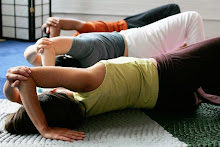 Moshe Feldenkrais often said, "If you don't know what you're doing, then you can't do what you want."
Moshe Feldenkrais often said, "If you don't know what you're doing, then you can't do what you want."
This whole know what you're doing thing is a key ingredient of awareness. It's astonishing how many people, in many different ways, will embark upon a program of improvement without really knowing what they are doing. They will rely on someone else's opinion of what they are doing, or what they should be doing, and then just follow the instructions. The "authority" is external: acting on the basis of what a doctor, a therapist, a bodyworker, a teacher, a TV commentator, a parent, says is "right."
The Feldenkrais Method includes the missing ingredient for a successful life: YOU. Your experience, your sensations, your emotions, your thoughts, your actions are essential to being engaged in any meaningful process of change. Feldenkrais' work, "to restore each person to their human dignity," validates and develops one's ability to have "internal authority."
For example, let's say you have a painful neck today. Again. Perhaps your personal trainer gave you some stretches and neck rolls to do. Maybe you have a prescription for pain killers. Just wait a few minutes before you do either, and try this:
Stop and breathe for a moment, and do nothing.
Notice: are you comfortable sitting in your chair? Does anything change if you sit so that both feet are flat on the floor? Sit for a moment like this.
Does any other place in your body come to your attention?
Does any place in your body feel particularly comfortable?
Make the smallest movement you can make to turn your head.
As you turn your head to the left and the right, are you approaching 90 degrees and feeling a stretch, or twinge? Which side is more comfortable, in this moment?
Notice what happens when you only move about 10 degrees in each direction, or less.
Notice what happens if you find the most comfortable range, instead of turning until you feel pain.
Notice what happens when you move your right shoulder forward a little bit, slowly, and then back. Does your left shoulder move back a little as the right shoulder comes forward? Could it?
Is your head moving a bit with the movement of your shoulders?
Keep the movement slow and smooth, and make sure you are breathing.
Let your head turn a little to the right when your right shoulder moves backward.
Let your head turn a little to the left when your left shoulder moves backward.
How could you make the movement smoother, easier?
What does it feel like to keep your head in the center as your shoulders continue to move in this way?
Stop for a moment and breathe.
Resume the small, smooth movement of bringing one shoulder forward, then the other.
Make a small movement to turn your head, just the tiniest bit, in the direction of the shoulder that is moving forward. Turn your head less than 10 degrees each time, make the movement small and smooth.
Stop for a moment and rest.
See if anything has changed. Is it more comfortable to turn your head now?
Does including your shoulders in the movement make things easier in your neck?
* * *
Before you set out on a journey, you need to know more than the destination. You need to know where you are NOW. Scientists call this, "sensitivity to initial conditions," and it can be seen as the environment in which action takes place. The route to Houston will be quite different if you are starting from Santa Fe, or Atlanta, or deep space. Each Feldenkrais lesson begins with noticing your initial conditions: your contact with the floor, or chair; where movement seems to feel the easiest; where are the places of greatest comfort. When you know your starting point, you can begin to make incremental changes, and test them out. Are your actions taking you in the direction where you want to go? Are your sensations the same or different, better or worse? As you experiment with small changes and stop frequently to notice the effects, you'll find that your actions become more refined and efficient. You will begin to do more of the things that are working, and less of the things that are not working. With awareness, you're less likely to make a wrong turn. If you should make a wrong turn (and we all do, from time to time), you're more likely to know sooner than later, and can modify your actions at a low personal cost.
The advice and actions of others are environmental factors, and must be factored in to the equation. The environment (our surroundings, our relationships, everything that is "outside of you") acts upon you as surely as you act upon it. With awareness, we can use our powers for good. "When you know what you're doing, you can do what you want." This is the key to life, liberty, and the pursuit of happiness, for everyone.



No comments:
Post a Comment